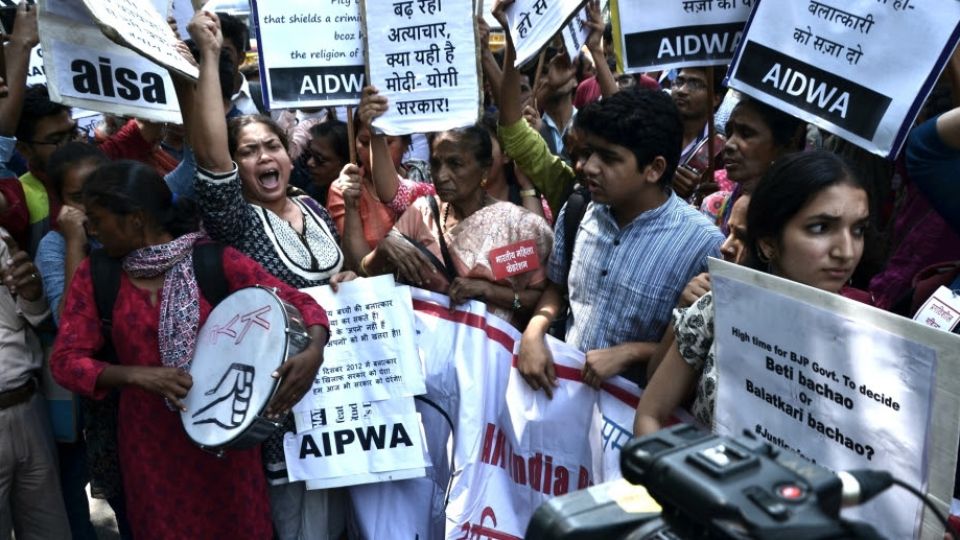April 13, 2018
Minor shepherd girl gangraped, killed to instil fear in nomadic tribe; 18-year-old raped by ruling Bharatiya Janata Party legislator.
Two rapes have rocked India this week bringing back memories of the brutal Nirbhaya gangrape of 2012 which led to the framing of new anti-rape laws awarding life term or death to rapists.
While the chilling gangrape and killing of eight-year-old shepherd girl Asifa in the restive Kashmir region has fuelled religious tensions, the other rape – of an 18-year-old girl – allegedly by a ruling Bharatiya Janata Party (BJP) legislator has left the nation shocked.
Asifa, a Muslim from a nomadic tribe, was grazing horses in Kathua village in India’s north when she was forcibly taken to a nearby Hindu temple, locked, drugged and gangraped over the next few days. Her strangled body was found dumped in the forest on January 17 a week after she was reported missing.
When the case came up for hearing on April 11, local lawyers affiliated to Jammu High Court Bar Association, tried to prevent the police from filing a chargesheet which names the caretaker of the temple as a culprit.
The kidnapping, rape and killing of Asifa was part of a planned, chilling strategy to instil fear and drive the nomads out of the region, reveals the 15-page chargesheet filed by the Jammu and Kashmir Police in the chief judicial magistrate’s court.
The other gangrape of the 18-year-old girl came to light when she attempted suicide on April 8 in Lucknow in front of the chief minister’s residence of India’s most populated state Uttar Pradesh.
Kuldeep Singh Sengar, the BJP legislator from the state, has been accused of raping the girl in June 2017. The four-time lawmaker and his brothers allegedly gangraped the girl and beat up her father in custody which led to his death. The victim tried to kill herself after her 55-year-old father died in custody.
What has angered India and, surely its women, is that the victim’s family went to the police following her rape in June, but no case was filed. On April 3, there was a fight between the victim’s family and the legislator’s family, both parties filed a police complaint, but the police acted only on one and sent the victim’s father to jail.
Sengar was booked by the Uttar Pradesh police on April 12 following a nationwide furore. He was taken into custody by the Central Bureau of Investigation on April 13.
India’s main opposition party Congress’ chief Rahul Gandhi led a midnight march on April 13 at New Delhi’s historic India Gate to protest the Kathua and Unnao minor rape cases and said it’s time for Prime Minister Narendra Modi to walk the talk on “beti bachao” – his pet save the girl child campaign.
“We are here against crimes being committed against women, against rapes, violence and murder and the government must act on this. This is a national issue and not a political one,” Gandhi said.
“We want the government to take action. Today, women are feeling insecure to move out of their houses. Somewhere a child, a woman is raped, killed and we want that the government should resolve this. The women of the country should feel safe,” he said.
According to India’s National Crime Records Bureau that collates annual data on crime there is a jump in crimes against women – 41.7 per cent to 53.9 per cent between 2011 and 2015.
Over 3,27,394 cases of crime against women were reported in 2015 alone. This includes 34,651 cases of rape, 4,437 cases of attempted rape, 59,277 kidnappings and abductions, 7,634 dowry deaths, and a whopping 1,13,403 cases of domestic cruelty.
The numbers reflect only the reported cases. A majority of crimes against women remain unregistered – as is seen in the Unnao rape victim’s case, or because of the stigma attached to reporting rapes and sexual crimes.
The ruling government has gone quiet on the matter.
As Barkha Dutt points out in her column for the Washington Post, “The silence of the top women ministers in the Modi cabinet on both the Kathua and the Unnao cases has been disturbing, and only undermines their track record as trailblazers. Women hold key portfolios of defense, foreign affairs, and information and broadcasting, among others. But what good are these path-breaking positions of authority if the women don’t speak for female victims of violence and abuse?”


